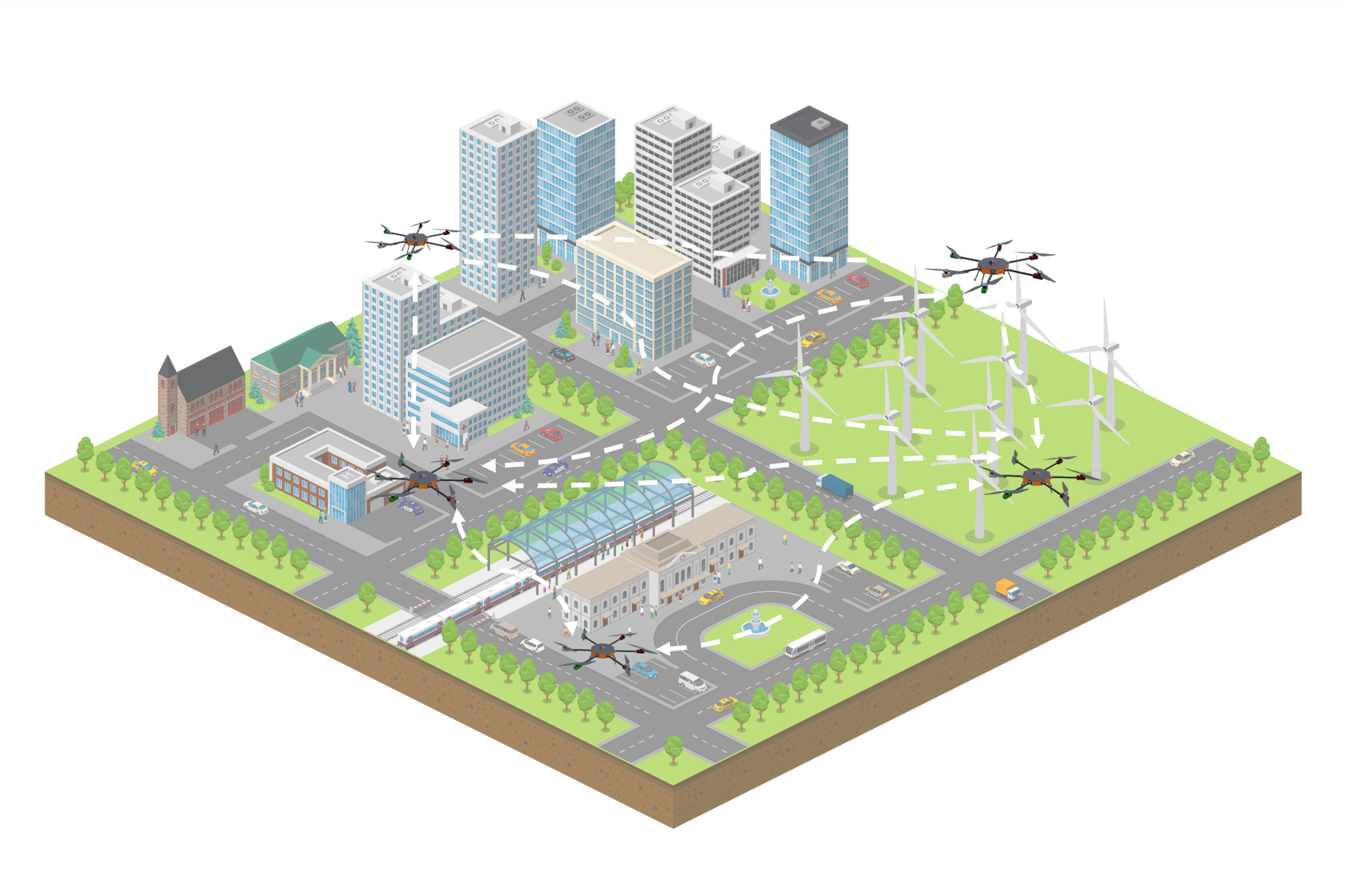Safer urban skies: Controlling drone aviation above German cities
Commercial aviation uses radar technology in their air traffic control systems to guarantee safe and smooth flights everywhere. For the AKIRA project, Fraunhofer researchers have teamed up with industry partners to develop a novel ground-based radar platform to take the same monitoring capabilities to the world of unmanned aviation. Their vision is one of secure passenger and cargo flights with automated drones in the skies above Germany’s urban centers. Starting on 28 February, a special two-day workshop on »Drone Technology for Logistics Applications« will be hosted by four Fraunhofer Institutes in Wachtberg.

Passengers on planes in the skies above Europe, Asia, America or elsewhere can fly with peace of mind, because one thing is certain: Air traffic control will always know exactly where each aircraft is and where it is going. Radar makes this fundamental certainty of modern passenger and cargo aviation possible and prevents virtually all collisions between manned aircraft. The same will soon be true for unmanned aircraft flying over Germany’s cities, if the researchers at the Fraunhofer Institutes IZM and FHR are to be believed. They are working with the IT security experts at esc Aerospace and ESG to test the capabilities of economical FMCW radar components that could work in ground-based radar to help track and trace drones and other unmanned objects in the urban space. Their ambitious goal is to reliably and permanently monitor all cooperative and non-cooperative flying objects up to altitudes of 100 meters.
Making drone communication as secure as conventional aviation
Achieving full radar coverage in the urban landscape with the varying heights and shapes of buildings is a challenge the researchers are planning to address by merging individual detection ranges of around 500 meters in a joint network. These closed sensor networks could communicate internally and stop drones from colliding with each other and track and share information about the location of airborne objects in a theoretically infinite range with the right server architecture.
As part of the AKIRA project, the researchers at Fraunhofer IZM are working on hardware for the integrated radar modules in each cell. Since conventional planar antenna designs are not an option, they are relying on geometrically precise 3D-MIMO antennas on substrates shaped in all three dimensions. Creating the molds and aligning the antennas are challenging tasks faced by the Fraunhofer IZM team, as the 3D antennas, using innovative MIMO radar architecture, will be the backbone of the ground-based radar stations covering up to 500 meters each. For complete coverage at altitudes of 100 meters, i.e. the space used by the unmanned drones, the stations will also need to be installed on public buildings or cellphone towers.
For their sub-project, the team of Fraunhofer FHR is investigating and assessing system concepts for the radar sensors in charge of detecting and categorizing objects as well as forming the data communication network (Dual Function Radar and Communication – DFRC). They are approaching their task by exploring suitable signal encoding and modulation approaches in simulations and testing them for their data transmission and detection performance. The requirements for the overall system’s design identified from this will be fed into the development of a functional demonstrator based on the evaluation hardware.
One design principle for the demonstration system is the use of as many freely available COTS components in the RF and digital hardware. This should help prepare for a later miniaturization and cost reduction of the design in cooperation with Fraunhofer IZM. Another system design goal of the researchers is to develop a suitable digital hardware platform that can create high-frequency transmission waveforms which can be controlled in real time for communication and detection purposes and for processing the incoming radar echoes and communication signals, again in real time. The system is designed in close consultation with Fraunhofer IZM, the Institute where the final demonstration system will be built. At this stage in the work, a first set of evaluation platforms is being developed, which will be produced and tested in the next few months. This initial platform will also be provided to industry partners to test the safety of the system under real-life conditions.
As a product-agnostic system integrator and product developer, esc Aerospace will safeguard all project data brought together in the drone detection system by ESG Elektroniksystem- und Logistik-GmbH against cyberattacks. The Security Operation Center (SOC) created by esc Aerospace follows the basic tenets of cybersecurity: Confidentiality, integrity, and availability (C-I-A). The SOC will monitor the system on a permanent basis, raise the alarm in the event of problems, and effectively ward off attacks from outside. The project started on the first day of 2022 and is scheduled to conclude on the last day of 2024. It is supported by the Bavarian Ministry of Economic Affairs, Regional Development, and Energy with EUR 2.8 million in funding.
Workshop »Drone Technology for Logistics Applications «
Anybody interested in drone technology can register for a special workshop on »Drone Technology for Logistics Applications«, hosted at Fraunhofer FKIE in Bonn-Bad Godesberg on 28 February and 1 March 2023. The participants will explore possible use cases and work out the essential trajectory and parameters for further research in the field. Their hosts will include experts from no fewer than four Fraunhofer Institutes (Fraunhofer IZM, Fraunhofer FHR, Fraunhofer IFF, and Fraunhofer FKIE) who have come together to develop novel logistics concepts with sensor innovation and sensor fusion solutions for drones. Their ambition: To increase the productivity of drones by more than 50%. In the pursuit of that goal, the Institutes want to team up with other European partners working in hardware and sensor development, AI signals processing, sensor fusion, drone technology, and logistics.
For more information about the program and the registration link, visit: https://www.fkie.fraunhofer.de/de/Veranstaltungen/workshop-drones-logistics.html.